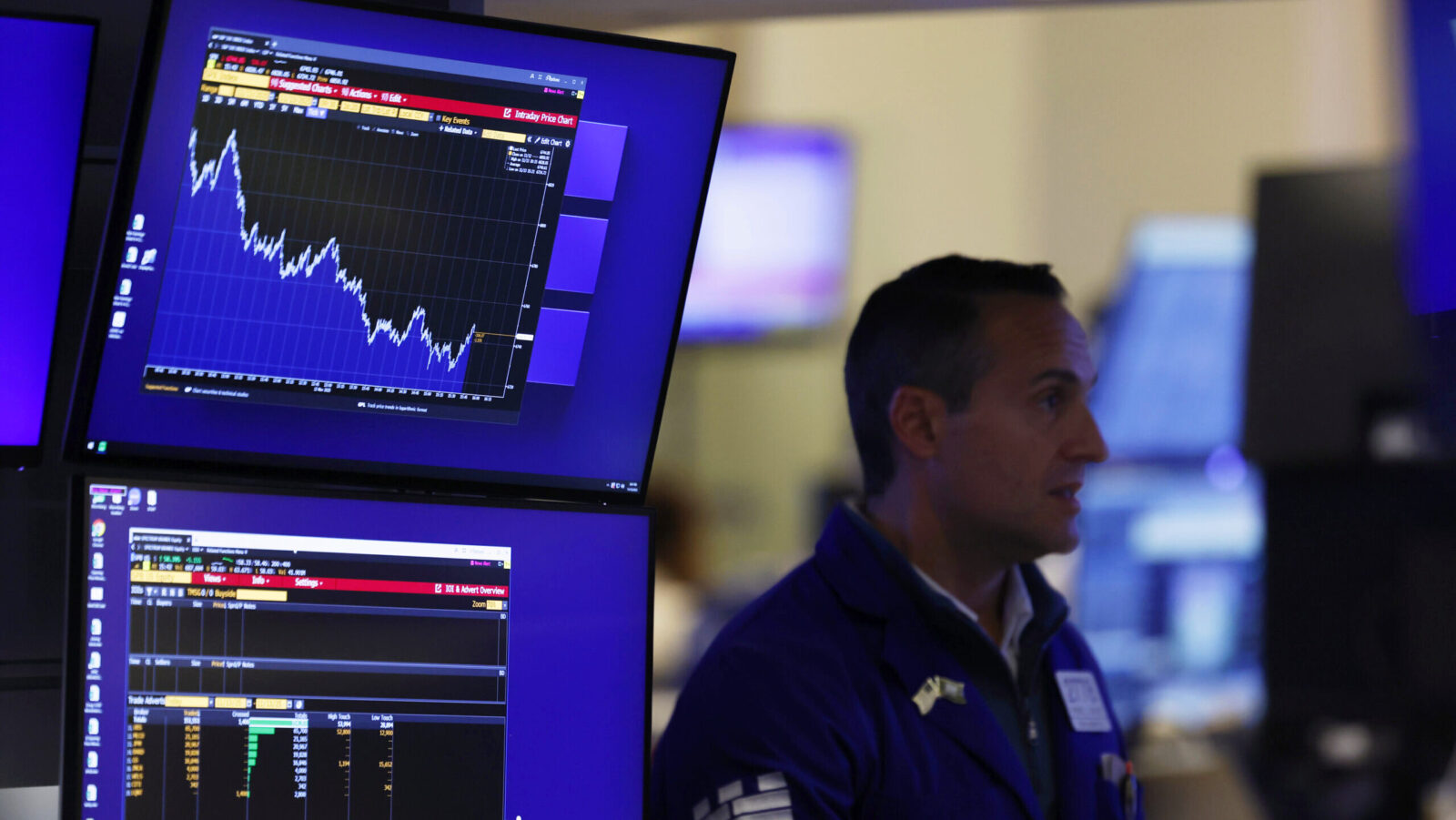Good morning.
Something smells good this week, and it’s not just the turkey. It’s equity markets cooking again.
Stocks closed up on Monday as tech fears faded and rate-cut optimism grew. But we’re not going to lie, holiday cheer may also be at play. That’s because Thanksgiving week has, historically speaking, been modestly exceptional. The S&P 500 has averaged a 0.28% return during turkey week, about double a typical week’s returns, according to data going back to 1928 tracked by Bank of America. Yet another thing to be thankful for.
Hedge Funds Start to Hedge Their AI Bets

It’s certainly not a Big Short. More like bigger than expected.
According to Goldman Sachs’ latest report on hedge fund positioning, seen by the Financial Times on Monday, Wall Street’s smart money is starting to take out some short positions on the AI trade, albeit mostly around the industry’s fringes. Still, the skepticism comes amid growing fears of a broader AI bubble, which yesterday’s rally hardly ended.
Billion-Dollar Bubble Busters
To be clear, hedge funds aren’t big-game hunting. Microsoft, Meta, Amazon, Alphabet and Nvidia remain the five most common long bets among funds analyzed by Goldman (Tesla, on the other hand, holds its position as one of the most popular short bets on Wall Street, with nearly $33 billion in short positions against it). Instead, the smart money appears to be on the hunt for companies swept up in the hype machine that may be flying too close to the sun.
Cases in point: Palantir ($9.9 billion in short positions), Oracle ($5.4 billion), Intel ($4.6 billion), and Qualcomm ($4.4 billion). Goldman analysts also flagged which companies received the highest short interest as a percentage of market cap, a figure that might be a little more reflective of where Wall Street sees froth:
- Bloom Energy, which makes on-site fuel cells for data centers, has seen its share price pop over 300% so far this year but now has a short interest that amounts to 18% of its public float. CoreWeave, the only major AI cloud provider with sub-investment-grade bonds, has short interest as a share of public float at 12%, while Robinhood, whose stock has climbed nearly 200% on the AI trading wave, is at 7%.
- In sum, the median S&P 500 short interest as a percentage of market cap (2.4%) is at its highest level in five years and above the long-term average since 1995. Short interest in the tech-heavy Nasdaq 100 is even higher, at 2.5%, while short interest in the Russell 2000 is at 5.5%.
Cut Off: The uptick in shorts doesn’t necessarily spell doom. The S&P 500 clawed more than 1.5% higher on Monday, after falling 2% last week, while the tech-heavy Nasdaq Composite had its best day since May. The rally was sparked in part by comments from New York Fed President John Williams, who said on Friday that he sees labor weakness as a bigger threat than inflation. CME’s FedWatch tool now shows odds of a December rate cut at 81%, compared with just 42% a week ago.
Top Ten Stocks To Buy, Today
For over three decades, The Motley Fool has been making great stock picks.
Amazon. Netflix. NVIDIA. Early on in each of their respective corporate rocketships, they’ve been Stock Advisor picks.
Now The Motley Fool is offering 68% off to new members — plus their NEW top 10 stocks to buy right now for Black Friday. One of their best deals of the year.
Claim your picks today, and maybe one of them could have you living it up on the south shore of France.
Bayer Resurrects Scrapped Blood-Thinning Drug as Breakthrough Stroke Treatment
Here’s to second chances. Two years ago, Bayer halted a Phase 3 trial of its blood-thinning treatment asundexian for patients with irregular heart rhythm who are at risk of stroke or systemic embolism. Numbers don’t lie, and the German biotech firm saw that drugs by Bristol Myers Squibb and Pfizer’s Eliquis had simply proven better.
On Monday, Bayer shares soared 10.9% thanks to asundexian. An experimental pivot saw the onetime failure, now repurposed for secondary stroke prevention (SSP), set the stage for a potentially blockbuster breakthrough in a new Phase 3 trial.
Back to the Drawing Board
It’s a story as old as the pharma business: Bayer is trying to diversify its portfolio as two of its best-sellers — anticoagulant Xarelto and Eylea, an ophthalmology drug for macular degeneration — are facing heightened competition, Xarelto from generics and Eylea from biosimilars.
Asundexian, after its ill-fated 2023 run, could solve the pipeline problem. Bayer said the drug significantly reduced the risk of stroke for patients who had experienced a non-cardioembolic ischemic stroke or high-risk ischemic attack when used in combination with antiplatelet therapy. Crucially, it did this without increasing the risk of major bleeding, a persistent concern with other blood-thinning treatments. The drug works by blocking Factor XIa, a protein that aids blood-clotting. The trial proved successful enough that Bayer said it plans to reach out to regulators in preparation for submitting the drug candidate for approval. The breakthrough was significant enough that Bayer pulled its competitors up along with it:
- Shares in Bristol Myers Squibb and Johnson & Johnson, which are together developing the drug milvexian, using the same mechanism as asundexian, rose 3.2% and 1% on Monday. Earlier this month, milvexian failed a trial for acute coronary syndrome, but it’s also being tested for secondary stroke prevention.
- Jefferies analysts said the asundexian breakthrough represents “a material de-risking event” for Bayer, whose shares have surged 58% this year. According to the World Stroke Organization, there are roughly 12 million new strokes per year.
Novo, No No: Not all pharmaceutical companies have been so fortunate. If there is one pharma company down on its luck in 2025, it’s Denmark’s Novo Nordisk. Shares in the company, which had previously lost nearly half their value this year, fell another 5.6% on Monday after Novo revealed its oral semaglutide, containing the active ingredient in Ozempic, failed a long-shot Alzheimer’s drug trial.

Get A Free Analysis Of Your Personal Wealth Strategy. Even the sharpest financial plans can miss attractive opportunities. Plancorp’s free, secure, and confidential financial-plan analysis — exclusively for The Daily Upside readers — stress-tests your wealth strategy and highlights overlooked angles. Get complimentary insights from Plancorp, a CNBC Top 100 advisory with 40+ years of fiduciary expertise. Discover what you’re missing.*
Ukraine Peace Talks Undermine European Defense Stocks
The defense sector was a casualty of potential peace on Monday.
European arms-makers have been breadwinners all year for stock pickers, with the war in Ukraine motivating governments on the continent to upgrade their defensive capacity. Deal or no deal, that trend isn’t over, which is why some analysts found the selloff a head-scratcher.
En Garde
Europe’s STOXX 600 index has climbed 11.5% this year and, like the S&P 500 on the other side of the Atlantic, has achieved a run of successive record highs. Underpinning the European rally is the aerospace and defense sector, up 45.9% this year as of Monday’s close. Russia’s invasion of Ukraine in 2022, which initiated the first large-scale land war on the continent since World War II, shocked governments into action and was followed by pledges of hundreds of billions in spending on regional security improvements.
Yet the prospect of peace spooked investors. The Stoxx Europe Aerospace and Defense index fell 2% on Monday, reaching the lowest point since early July. German defense firms Rheinmetall, Hensoldt and Renk were down 5%, 4.5% and 4.4%, respectively, while Sweden’s Saab tumbled 5.6%, Italy’s Leonardo 2.3%, and France’s Thales 1.5%.
Several analysts, however, say the selloff made no sense:
- “Even if there is a deal agreed, the sector should not see a market-shock drop, as European defense valuations are underpinned by structural increases in defense budgets across Europe, rather than by short-term revenues from Ukraine,” Morningstar analyst Loredana Muharremi wrote in an investor note.
- “We see the sector as undervalued following the recent market correction, with over 20% potential upside,” added Muharremi.
The Bureaucrats’ Pledge: The European Commission estimates EU defense spending will reach €392 billion ($451 billion) this year, nearly double its level four years ago before Russia invaded Ukraine. The commission also forecasts €3.4 trillion ($3.9 trillion) will be spent on defense in the next decade. That’s going to last a lot longer than the current investor jitters.
Extra Upside
- Hoosier Data: Amazon will pour $15 billion into building data center campuses in Indiana.
- Burry, the Lede: Michael Burry, the “Big Short” investor who has made headlines warning of an AI bubble, is changing careers: After closing his hedge fund, he’s now a blogger with a $379-a-year Substack.
- From Banking To Business, Blockchain Is Opening Up New Opportunities Globally. Stay informed on current trends with Ripple’s Block Stars, a commuter-friendly podcast hosted by industry expert David Schwartz. Check out Ripple’s Block Stars now.**
** Partner
Just For Fun
Disclaimer
*For informational purposes only; should not be used as investment tax, legal or accounting advice. Plancorp LLC is an SEC-registered investment adviser. Registration does not imply a certain level of skill or training nor does it imply endorsement by the SEC. All investing involves risk, including the loss of principal. Past performance does not guarantee future results. Plancorp’s marketing material should not be construed by any existing or prospective client as a guarantee that they will experience a certain level of results if they engage our services, and may include lists or rankings published by magazines and other sources which are generally based exclusively on information prepared and submitted by the recognized advisor. Plancorp is a registered trademark of Plancorp LLC, registered in the U.S. Patent and Trademark Office.
